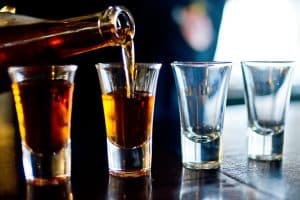Content of alcohol
The usual alcohol content for each is:

Beer 2–6% alcohol
Cider 4–8% alcohol
Wine 8–20% alcohol
Tequila 40% alcohol
Rum 40% or more alcohol
Brandy 40% or more alcohol
Gin 40–47% alcohol
Whiskey 40–50% alcohol
Vodka 40–50% alcohol
Liqueurs 15–60% alcohol
What is a stimulant?
Stimulants refer to a class of drugs that excite your central nervous system (brain and spinal cord). They may increase your blood pressure and heart rate. When you take a stimulant, it can make you feel more alert and energetic.
Examples of stimulants include caffeine and amphetamines which are mild and strong stimulants respectively. Some stimulant drugs are illicit such as cocaine.
What is a depressant?
Depressants refer to a class of drugs that slow down your central nervous system (brain and spinal cord). They may decrease your blood pressure and heart rate. When you take a depressant, you might feel relaxed and it may sedate you partially or completely.
Examples of depressant drugs:
- Alcohol
- Benzodiazepines
- Barbiturates
- Cannabis
- Heroin
- ketamine
Is alcohol a stimulant or depressant?
People usually drink alcohol to enhance their mood and think that alcohol is a stimulant that can give you energy, and decrease your inhibitions.
But it is classified as a depressant due to its effects on the mind and body. Alcohol has some initial stimulant effects, but it’s primarily a stimulant which raises your heart rate, along with some other physical changes. Alcohol is in fact, truly a depressant. Think about how you feel when you drink alcohol, especially in excess, you start slurring your words and you have slower reaction times. As you can see, while alcohol does have some stimulant effects, it’s scientifically classified as a depressant.
Stimulant effects of alcohol
Alcohol has some initial stimulant effect due to the dopamine (happy hormone) release which can cause you to feel stimulated and energized.. Some people may experience more stimulating effects from alcohol, while others may experience more depressant effects. Stimulant effects occur when your blood alcohol concentration (BAC) approaches 0.05 mg/l but are replaced by more depressant effects once your BAC reaches 0.08 mg/l.
Depressant effects of alcohol
Alcohol has some initial stimulant effects and after that slow down your central nervous system (brain and spinal cord). They may decrease your blood pressure and heart rate. The person may feel sad if ingested higher dose of alcohol due to the suppression of dopamine production and may seem sleepy and sedated if ingested large amount of alcohol.
Health impacts of alcohol
The stimulant effects and the depressant effects can be different for everyone. How alcohol affect someone’s body can depend on a number of factors such as your
- Age
- Sex
- Weight
- Drinking on an empty stomach or eating while you drink
- Mental and physical health
- Use of other drugs and medications
- Alcohol tolerance
Those who experience more stimulant effects are more susceptible to alcoholism.
- Liver damage
- Memory loss
- Impaired brain function
- Mood changes
- Obesity
- Cardiovascular problems
- Increased risk of cancer
- Slurred speech
- Stomach distress
- Digestive tract problems
- High blood pressure
- Reduces body’s natural immune system
- Behavior changes
- Hallucinations
- Lung infections
- Sexual dysfunction
- Malnutrition
- Diabetes complications
- Changes in coordination
- Muscle cramps
When does alcohol become dangerous?
Alcohol becomes dangerous if you drink too much regularly or you experience alcohol poisoning. If you drink a glass of wine once a week with a dinner is not a serious concern. If you drink a bottle of wine every day for months becomes dangerous. If the person face the following symptoms, immediate medical assistance is necessary. Alcohol intoxication could stops body functioning, if not given medical assistance quickly. Some of the common symptoms of alcohol poisoning are:
- Bouts with severe confusion
- Vomiting in excess
- Skin that begins to turn a pale gray or blue color
- Incredibly slow breaths (under eight during a one-minute span)
- inability to remain conscious
- Death

Prof. Venkata Kiran Kumar Mandlem is Head Of Department in CMR College of pharmacy Hyderabad . He Completed PhD in Pharmaceutical Sciences from Andhra University . More info about him MV Kiran Linkedin
